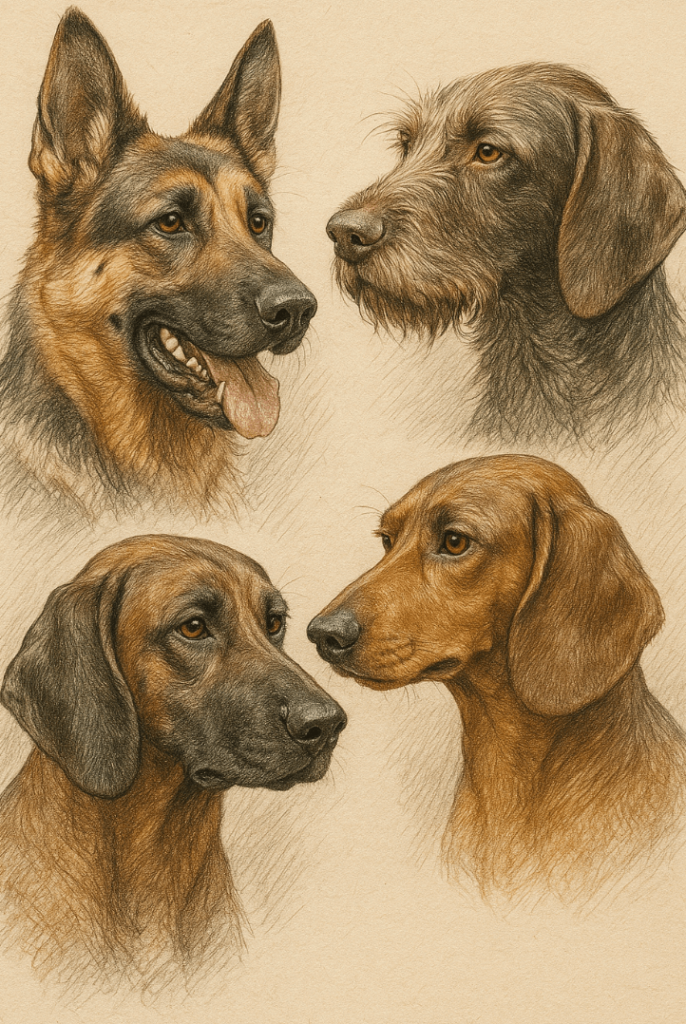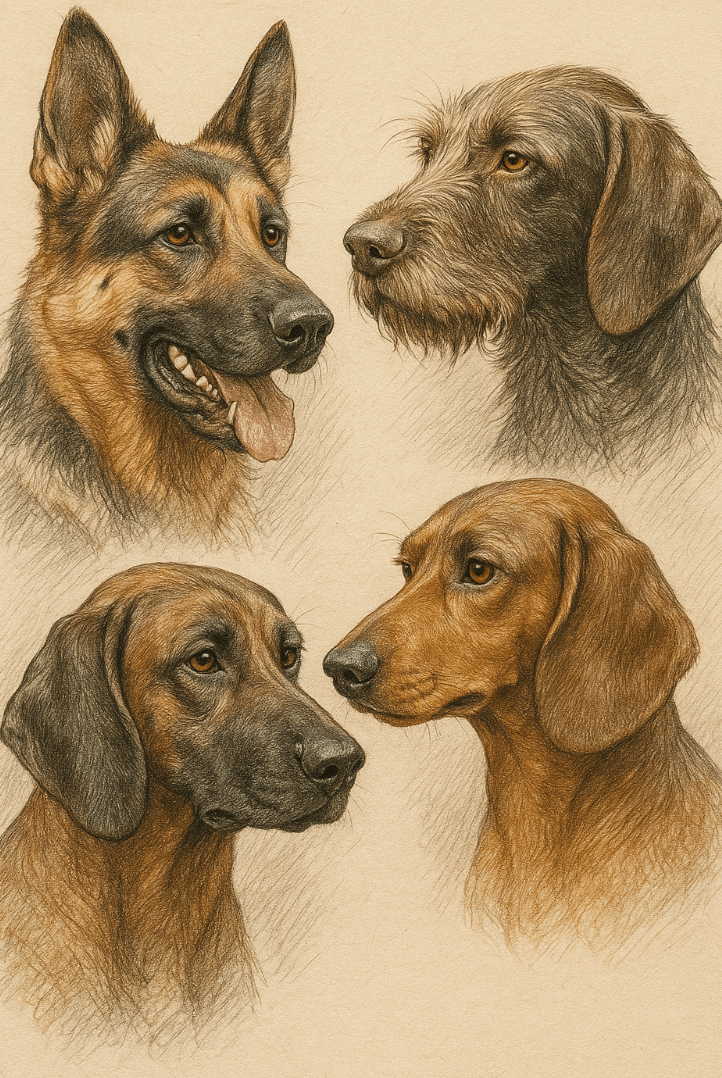Bavarian Dog Breeds: A Celebration of Heritage and Loyalty
The picturesque landscapes of Bavaria, Germany, are not only known for their stunning alpine views and rich cultural traditions but also for their unique contributions to the world of dog breeds. Bavarian dog breeds embody the region’s spirit—hardworking, loyal, and versatile companions that excel in various roles, from herding livestock to hunting game in rugged terrains.
These dogs are celebrated for their intelligence, resilience, and adaptability, traits honed over centuries of working alongside humans in challenging environments. Whether you’re a dog enthusiast or simply curious about these remarkable animals, exploring Bavarian dog breeds offers a fascinating glimpse into their history, characteristics, and enduring appeal.
Popular Bavarian Dog Breeds You Should Know
Bavaria has gifted the world with several distinctive dog breeds, each with its own unique qualities and purposes. Here are some of the most notable Bavarian breeds that have captured the hearts of dog lovers worldwide.
Bavarian Mountain Hound:
Known for their exceptional tracking abilities, these scent hounds are often used for hunting wounded game in mountainous regions.Bavarian Scent Hound (Bayrischer Gebirgsschweißhund):
This breed is prized for its keen sense of smell and determination, making it ideal for blood tracking and search-and-rescue missions.Münsterländer:
Available in both Large and Small varieties, Münsterländer dogs are versatile hunters, excelling in retrieving and pointing tasks.Leonberger:
Though not exclusively Bavarian, this giant breed originated in nearby Leonberg and shares cultural ties with Bavarian working dogs. They are gentle giants known for their loyalty and strength.Appenzeller Sennenhund:
While primarily associated with Switzerland, this breed has close ties to Bavarian herding dogs and is admired for its agility and herding skills.
These breeds showcase the diversity and functionality of dogs bred in Bavaria, reflecting the region’s emphasis on practicality and partnership.
Key Characteristics of Bavarian Dog Breeds
Bavarian dog breeds share several traits that make them stand out among other canine companions. These characteristics have been shaped by centuries of selective breeding for specific tasks and environments.
Hardworking Nature:
Many Bavarian breeds were developed as working dogs, excelling in roles such as hunting, herding, and guarding livestock.Adaptability to Harsh Climates:
Their thick coats and robust builds allow them to thrive in cold, mountainous terrains typical of Bavaria.Intelligence and Trainability:
These breeds are highly intelligent, making them quick learners and eager participants in training sessions.Loyalty and Companionship:
Bavarian dogs form strong bonds with their families, often becoming devoted protectors and affectionate pets.Versatility in Skills:
Whether tracking scents, retrieving game, or herding cattle, these dogs are capable of performing multiple tasks with precision.
These shared traits highlight why Bavarian dog breeds remain popular choices for both work and companionship around the globe.
Check this guide 👉Discover the Bavarian Mountain Hound: Best 7 Expert Tips!
Check this guide 👉Boucheron Dog Breed: Best 7 Expert Tips!
Check this guide 👉Healthiest Dog Breeds: Best 7 Expert Tips!

Bavarian Dog Breeds | Primary Uses and Traits |
|---|---|
Bavarian Mountain Hound | Tracking wounded game; excellent stamina |
Bavarian Scent Hound | Blood tracking; strong sense of smell |
Large Münsterländer | Hunting waterfowl; versatile retriever |
Small Münsterländer | Pointing and flushing game; energetic |
Leonberger | Family guardian; gentle temperament |
Why Choose a Bavarian Dog Breed?
If you’re considering adding a Bavarian dog breed to your family, there are many compelling reasons to do so. These breeds offer a unique combination of personality, skills, and charm that make them exceptional companions.
Strong Work Ethic:
Whether you need help managing livestock or enjoy outdoor adventures, these dogs bring energy and dedication to any task.Family-Friendly Temperament:
Despite their working roots, Bavarian breeds are known for being loving and protective members of the household.Low Maintenance Grooming Needs:
Most Bavarian breeds have short to medium-length coats that require minimal grooming compared to high-maintenance breeds.Active Lifestyle Compatibility:
Their love for physical activity makes them perfect matches for active individuals or families who enjoy hiking, running, or playing outdoors.Cultural Heritage Appeal:
Owning a Bavarian dog breed connects you to centuries of tradition and history tied to the region’s rural way of life.
With so many advantages, it’s no wonder that Bavarian dog breeds continue to win hearts across the world.
Challenges of Owning a Bavarian Dog Breed
While Bavarian dog breeds are undeniably impressive, they also come with certain challenges that potential owners should consider before committing to one.
High Exercise Requirements:
These active dogs need plenty of daily exercise to stay happy and healthy, which may be demanding for less active owners.Training Consistency Needed:
Although intelligent, Bavarian breeds can sometimes display stubborn streaks, requiring patient and consistent training methods.Space Requirements:
Many of these dogs thrive in open spaces, making them better suited for homes with yards rather than small apartments.Potential Prey Drive Issues:
Bred for hunting and herding, some Bavarian breeds may chase smaller animals unless properly trained and socialized.Weather Sensitivity:
While adapted to colder climates, some breeds may struggle with extreme heat due to their thick coats.
Understanding these challenges ensures you’re prepared to meet the needs of your Bavarian dog breed effectively.
Tips for Caring for a Bavarian Dog Breed
Proper care is essential to ensure your Bavarian dog thrives in its new home. Follow these tips to create a nurturing environment for your furry companion.
Provide Ample Exercise Opportunities:
Take your dog on long walks, hikes, or runs to satisfy their need for physical activity.Focus on Mental Stimulation:
Use puzzle toys, scent games, and obedience training to keep their sharp minds engaged.Maintain a Balanced Diet:
Feed high-quality food tailored to their age, size, and activity level to support overall health.Regular Veterinary Checkups:
Schedule routine vet visits to monitor for breed-specific health concerns and maintain vaccinations.Socialize Early and Often:
Introduce your dog to different people, animals, and environments to foster confidence and reduce anxiety.
By following these guidelines, you’ll set the foundation for a happy and healthy relationship with your Bavarian dog.
Famous Bavarian Dogs in History and Pop Culture
Throughout history, Bavarian dog breeds have left their mark through acts of heroism, service, and even fame.
Rescue Heroes:
Bavarian Mountain Hounds have been instrumental in locating missing persons in avalanche-prone areas.Hunting Legends:
Münsterländer dogs gained renown for their unmatched ability to retrieve game from land and water.Royal Companions:
The Leonberger was favored by European royalty, including King Louis I of Bavaria, for its regal appearance.Film Stars:
Some Bavarian breeds have appeared in movies and TV shows, showcasing their intelligence and trainability.Symbolic Mascots:
Certain Bavarian breeds serve as mascots for local festivals and events, celebrating regional pride.
These stories highlight the lasting impact Bavarian dogs have had on society beyond their original roles.
How to Find a Reputable Bavarian Dog Breeder
Finding a responsible breeder is crucial to ensuring you bring home a healthy and well-socialized puppy.
Research Pedigree and Lineage:
Look for breeders who prioritize genetic testing and transparency about their dogs’ ancestry.Visit the Breeding Facility:
A reputable breeder will welcome you to see where puppies are raised and interact with adult dogs.Ask About Health Guarantees:
Ensure the breeder provides documentation of health clearances and guarantees against congenital defects.Observe Puppy Behavior:
Healthy puppies should be curious, playful, and comfortable interacting with humans.Check Reviews and References:
Seek feedback from previous buyers or online reviews to verify the breeder’s reputation.
Choosing a responsible breeder sets the stage for a lifelong partnership filled with joy and trust.
Frequently Asked Questions About Bavarian Dog Breeds
Are Bavarian dog breeds good with children?
Yes, most Bavarian breeds are friendly and protective, making them excellent companions for families with kids.
Do Bavarian dog breeds require professional training?
While basic obedience training at home is sufficient for many, professional guidance can enhance their natural talents.
How much exercise do Bavarian dog breeds need?
On average, they require at least 1-2 hours of vigorous exercise daily to burn off excess energy.
Are Bavarian dog breeds suitable for first-time owners?
Some breeds, like the Leonberger, are beginner-friendly, while others may be more challenging due to their high energy levels.
What health issues are common in Bavarian dog breeds?
Hip dysplasia, bloat, and eye conditions are among the potential concerns, though responsible breeding minimizes risks.
Embracing the Legacy of Bavarian Dog Breeds
Bavarian dog breeds represent the perfect blend of functionality, beauty, and heritage. From their origins as hardworking partners in the fields and forests of Bavaria to their modern-day roles as cherished family pets, these dogs continue to inspire admiration and respect. By understanding their unique traits, needs, and histories, you can appreciate why they hold such a special place in the hearts of dog enthusiasts worldwide. Whether you’re drawn to their loyalty, versatility, or cultural significance, owning or simply admiring a Bavarian dog breed is a testament to the timeless bond between humans and their four-legged friends.
Pemphigus Erythematosus in Cats: Best 7 Expert Tips! – Learn to recognize symptoms, manage flare-ups, and improve your cat’s quality of life.
Pemphigus Erythematosus in Dogs: Best 7 Expert Tips! – Discover causes, symptoms, and treatment options to manage this autoimmune skin condition effectively.
Cat Tympanic Membrane: Best 7 Expert Tips! – Learn how to protect your cat’s eardrum, spot issues early, and ensure lifelong auditory health.
Dog Tympanic Membrane: Best 7 Expert Tips! – Learn how to protect your dog’s eardrum, spot issues early, and ensure lifelong ear health with expert advice.





